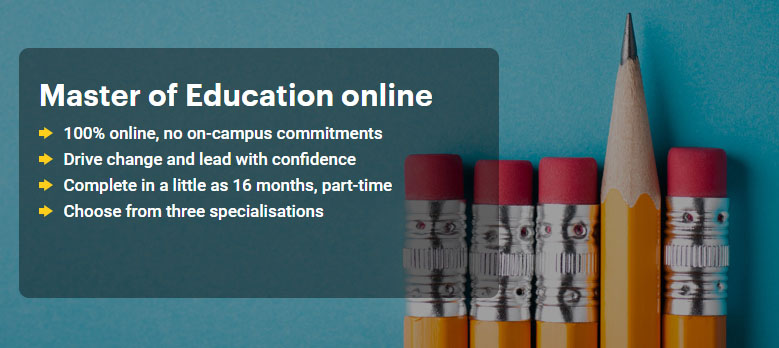University Essentials for Education
Courses to set you off on your education journey

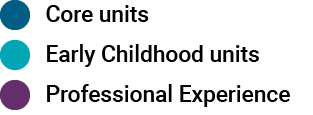
This is a visual representation of a typical double degree in Education. Your circumstances could be different, depending on how you study. Refer to the Course Progression link here.

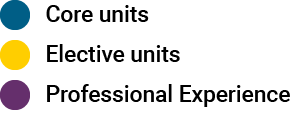
This is a visual representation of a typical double degree in Education. Your circumstances could be different, depending on how you study. Refer to the Course Progression link here.

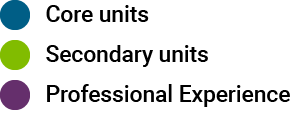
This is a visual representation of a typical double degree in Education. Your circumstances could be different, depending on how you study. Refer to the Course Progression link here.

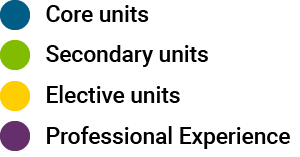
This is a visual representation of a typical double degree in Education. Your circumstances could be different, depending on how you study. Refer to the Course Progression link here.


This is a visual representation of a typical double degree in Education. Your circumstances could be different, depending on how you study. Refer to the Course Progression link here.
What to expect of your studies
All courses are designed with a logical sequence and structured to initially immerse you in the content discipline of what you are going to teach. You are then provided with understanding of how to teach. Finally you combine this knowledge and discover how to implement this in an educational setting. There are seven units that make up the core of all undergraduate units.
Congratulations on choosing to enrol in an Education degree. My name is Tess Boyle and I'm a lecturer here at Southern Cross.
Today I've been asked to speak briefly about a suite of core units you'll be studying throughout your degree. There are 7 core units and these have been strategically placed within your degree structure to provide touchstones to some of the big ideas underpinning the more applied components of the degree. Collectively the core units cover an array of subjects including Sociology, Psychology, Philosophy, Technology, Numeracy, Literacy, Diversity and Inclusion. These units are trans-disciplinary and cross-sectoral, meaning they relate to all subject discipline areas and all age groups. We've done this intentionally in the hope that SCU graduates leave us with the comprehensive and informed understanding of the ways these big ideas influence education from the cradle to the grave.
Perhaps most importantly, the core units provide you with an opportunity to engage with and think critically about the social, historical, economic, political influences on, and ethical implications of your work as an educator. You're joining the profession at a very exciting time. The children and young people you'll be working with may not yet be born, and the realities of their adult lives not yet imagined. Preparing to be an educator of the future, one that really does make a difference, will require you to think deeply about, challenge, and make connections between the big ideas presented in the core units.
I look forward to working with you in Introduction to Teaching, one of the 7 core units. In this unit, you'll be presented with an eyes-wide-open overview of the profession, connecting theory to practice through reflective thinking and writing, you'll be challenged to examine your own assumptions and beliefs about what it means to be an educator in the 21st Century.
All the very best for your studies here at SCU and for your future as an educator.
What is LANTITE?
The Language and Numeracy Test for Initial Teaching Education - otherwise known as LANTITE - is a compulsory test for all education students in literacy and numeracy. It was introduced by the government to ensure that all teachers, irrespective of the level or stage of students they engage with, are literate and numerate.
When do I have to complete the test?
You need to register and complete LANTITE as early as possible. You will not be able to enrol in Professional Experience units without successful completion of both components of LANTITE. We recommend registering to complete the test at the first opportunity.
How can I prepare?
You are supported to successfully achieve LANTITE by working through the Language and Literacy, and Mathematics and Numeracy units. Both are studied in your first session.
Websites for sample tests and more information:
Professional Experience Placements
Professional experience placements generally occur in your second year of study. You will need to consider your personal commitments and the time requirements to complete the professional placements.
Hello everyone! Welcome to Southern Cross University and the School of Education. I'm Sue Hudson, and I'm the Director of Professional Experience.
First, I want to congratulate you on selecting teaching as your career. What a wonderful decision you have made.
Professional experience is the really exciting component of your teacher education degree. It's where you have the opportunity to take what you have learned at university and apply it to the real world context of the school or early childhood centre.
WIth any profession, there are particular requirements that you need to adhere to. The first is that you need a Working With Children check for your state or territory. Before you undertake any professional experience or any informal visit to a site or any interaction with children and young people, you require a Working With Children check if you live in NSW, or a Blue Cared if you work in QLD. If you live in Northern NSW or South East QLD you require both.
It's a good idea to apply for your Working With Children check or Blue Card right now during Orientation to avoid any disappointments in the future around any site visits.
Another requirement for professional experience is that you need to undertake the professional experience in a block and you need to attend on the dates that are noted on the professional experience calendar. The dates are really not negotiable. You need to attend and complete your professional experience on the dates noted. The calendar is available to you the year before. So you can go on to the professional experience website, check out the dates, and ensure that you can arrange any child care, and perhaps you might need to take some time away from work as well.
When you attend your professional experience, you'll work alongside a mentor teacher, who's experienced, who will guide and support you to assist you to become the best teacher that you possibly can.
You'll find all this information on the professional experience website. If you go to School of Education site, and then scroll down on the left-hand side, you'll see the link to the professional experience website. There are actually 15 points that you can go through that will assist you to prepare for your professional experience.
If you have any queries about professional experience, you are welcome to contact the professional experience staff. We have professional experience office staff at each of the campuses. At Coffs Harbour we have Jenny Barron, at Lismore we have Sandra Kenny and Judy de Vries, and at the Gold Coast we have Alison Adams. You can contact them by emailing educationplacements@scu.edu.au If you have any other queries or questions, you're also welcome to contact me, Sue Hudson, the Director of Professional Experience at sue.hudson@scu.edu.au
I want to wish you all the best for your professional experiences and I want to wish you all the best for your time at Southern Cross University. Enjoy.
For a full list of activities you need to complete before and during your teacher training placement, please visit scu.edu.au/education/index.php/86.
Additional Resources
Get up to speed with some of the key study skills that you'll need during your time at Southern Cross University. You can find a full suite of study skill modules in The Study Toolkit
Courses to take your skills and experience into the classroom
Master of Teaching (Early Childhood or Secondary)
This is a graduate-entry qualification that prepares graduates for secondary or early childhood teaching. Graduates will typically work as teachers in either secondary or in early childhood settings, nationally and internationally. Some graduates may pursue work in a range of training and development settings in industry, the public service and the arts.
What to expect
The Master of Teaching is comprised of a suite of 16 units to provide a wide understanding of teaching and learning for the 21st century. The course aims to ensure teachers are able to respond to ever changing educational issues, technology and inquiring minds.
Graduate Diploma in Education (Early Childhood)
This course provides graduates with an early childhood teaching qualification to work with children from birth to five years. Admission into the course is via an undergraduate degree in any discipline, including a three-year teaching qualification. Career opportunities arising from this course include early childhood teacher in preschool and long day care (child care) settings, family day care educator and early childhood service.
What to expect
The Graduate Diploma in Education (Early Childhood) is comprised of eight units covering key areas of early childhood education and care from theory, and principles to practices that best support children's learning and development. Students undertake 60 days of professional placement across two settings: pre-school setting and an infant and toddler setting.
What to expect of your studies
Academic Staff in the School of Education engage in a diverse range of educational research projects, the outcomes of these research projects has informed policy and practice and the education profession, both nationally and internationally, as well as influencing the School's curricula and teaching practice.
Hello. I'm Raoul Adam, and I look after the suite of research units in the Master of Teaching.
I'd just like to take a little bit of time to tell you about the 3 units for the Masters of Teaching - why they're there, and why research is a very significant part of your degree.
The first unit is the Critical Literature Review, and in this unit you'll take the opportunity to really formulate a research question, a research problem that really interests you and to immerse yourself in the existing literature that's out there, to find out what's already been said.
The second unit is an introduction to research methods in education. So in this unit, you'll really start to dig down into the ways of collecting data and analysing data to inform your answers to that question or that problem.
Finally, the last unit, the Research Project is a double-weighted unit, and in that unit, you'll take time to really analyse and discuss your data and to really think deeply and try to communicate the practical implications of your research for your teaching profession.
So why is research such a significant component of the Masters of Teaching? Well, teachers are research. Research is really a fancy way of finding out. And teachers do that all the time. We ask ourselves questions like:
Why does this learner behave in this way?
What ways of teaching might be most appropriate to this type of learner?
So we're always asking questions, and research is a fairly structured, systematic, immersive way of finding out what the important questions are and thinking about ways of finding data or evidence that helps to inform those questions and ultimately, to make us better teachers.
So the teaching-research nexus is really, really important. That interaction, that interface between how we teach and why we teach that way, on what evidence do we base our teaching. That's so important to who we are as teachers, and that's why it's a significant part of the Masters of Teaching.
The structure of the units - they really fit together in a sequence, in a chronological order, that moves you from that initial finding a problem that you're interested in, engaging with the literature that already exists, thinking about how you collect data, how you analyse data within your research methodology, and then, how do you discuss what you've actually found and present what you've found, and that forms the final double-weighted unit, the Research Project.
So ultimately, all of the assessment in these units is geared towards a final - I guess it's like a mini thesis, or a mini dissertation, something that is very unique to your interests and to your research problem and that hopefully you can be proud of and it will be practical for your own teaching at the end of the suite of research units.
So what sort of learning experiences can you expect throughout these research units? Well, there'll be Collaborate sessions, where you get to interact with your peers and your Unit Assessor, online in real time. There'll also be discussion boards where you can upload your ideas and engage in sort of critical debate and discussion with your peers and your Unit Assessor. You'll have many occasions where you really just chew over your ideas - nut them through with a mentor or a supervisor, almost like a traditional supervisor-student relationship in a higher research degree like a PhD. So it's a great sort of entry point into the research process and the sort of relationships in Higher Education that make that process rewarding, challenging and very worthwhile.
Perhaps a challenge of the suite of research units is how much autonomy you have over what it is you actually research. How much autonomy you have over the sort of literature that you choose to engage with. So ultimately, that gives great scope and great freedom to pursue topics that you're interested in and we provide very structured scaffolds that you can work from or you can depart from. But that's one of the challenges of these research units is really taking ownership of your research project, studying independently and really being the driver of your topic, your research problem, the methods that you choose.
So perhaps a final question worth address is: What can I learn from past students' experiences? Well certainly reflecting on those experiences - really getting started early. Thinking deeply about topics, questions, research problems that interest you in the context of teaching, in the context of education, your curriculum specialisation, your teaching areas - what interests you, what's going to drive you and motivate you to find out about throughout those 3 units of the research suite. That is very, very important. The second thing is, we have to be organised. In a project across a sequence of units that allows freedom and autonomy, it is really up to you - while you'll have scaffolding in place - to organise yourself, to recognise the external commitments that you have and to structure your progress throughout those key phases of research so that you can manage them and fit them in, in a timely manner.
Organisation is absolutely key. Asking for help. Communication. Regular communication with your peers, with your Unit Assessor, and your supervisor if you have an external supervisor, that is absolutely fundamental to working your way successfully through the suite of research subjects and submitting that final research project on time, and something that you can be proud of and something, more importantly, perhaps most importantly, that'ls meaningful and practical - useful to your own teaching.
So that when you finish your degree and possibly you're working in a school or some educational situation, the research that you've done throughout these units - it makes you a better practitioner. One who's more able to ask the meaningful questions that all teachers, all educators might encounter in a school context, or even beyond the school context in other arenas of education.
Hopefully you'll see at the end of the sequence of units that really meaningful, important connection - that interface between researching and teaching.
What is LANTITE?
The Language and Numeracy Test for Initial Teaching Education - otherwise known as LANTITE - is a compulsory test for all education students in literacy and numeracy. It was introduced by the government to ensure that all teachers, irrespective of the level or stage of students they engage with, are literate and numerate.
When do I have to complete the test?
You need to register and complete LANTITE as early as possible. You will not be able to enrol in Professional Experience units without successful completion of both components of LANTITE. We recommend registering to complete the test at the first opportunity.
How can I prepare?
You are supported to successfully achieve LANTITE by working through the Language and Literacy, and Mathematics and Numeracy units. Both are studied in your first session.
Websites for sample tests and more information:
Professional Experience Placements
Professional experience placements generally occur in your second year of study. You may need to consider your personal commitments and the time requirements to complete the professional placements.
Welcome to your Masters of Teaching course here at Southern Cross University. My name is Cathy Lembke and I will be your Unit Assessor for your Professional Experience units as part of this course.
So you'll be doing 2 Professional Experience units - Professional Experience 1: Enhancing Student Learning, and Professional Experience 2: Evaluation of Teaching.
You actually go out into schools in your first Session, and that's part of another unit called the Learning Environment. That is just an immersion experience at the end of Session 1 where you will go into schools for 15 days. And in those 15 days you will actually just observe teachers and get to know schools, you don't actually have to do any teaching practice at that point.
When you come back in Session 2, you will go into your first Professional Experience unit. And that is actually going to set you up for a 20 day practicum where you will be doing teaching at the end of that Session. So that unit is actually about the skills and strategies that you need to have a successful first teaching practice in schools.
So there'll be lots that you will learn in that unit in relation to setting you up for a very successful first prac experience where you will be assessed on your teaching practice at that point.
In your second year, in Session 1 you will come back for Professional Experience 2. And that is when we will start to transition you into that real world of teaching. So you will complete a second prac at the end of that Session and that will be 25 days in schools.
We will be organising that for you - all your practicums here are organised for you through the Professional Experience Office. In that first year, you will actually be in 1 school - the immersion experience and your first prac experience is done at the same school. And then in your second year you'll go to a different school to actually complete your second prac experience.
I'm looking forward to spending some time with you over these 2 years. If you have any questions or queries or concerns about your Professional Experience units, please don't hesitate to contact me. I'm certainly passionate about professional experience s part of this course and I would really like to see you have a successful and enjoyable experience out in our schools.
For a full list of activities you need to complete before and during your teacher training placement, please visit scu.edu.au/education/index.php/86.
Additional Resources
Get up to speed with some of the key study skills that you'll need during your time at Southern Cross University. You can find a full suite of study skill modules in The Study Toolkit
Online Master of Education
If you are looking for the Master of Teaching (Early Childhood or Secondary), you will find it here.
This is the SCU Online Master of Education. Visit the SCU Online page for further information on the course and key staff contacts.
Tell us what you think!The University Essentials for Education is a pilot module and we would like to know what you think about it. Please click here to let us know.
